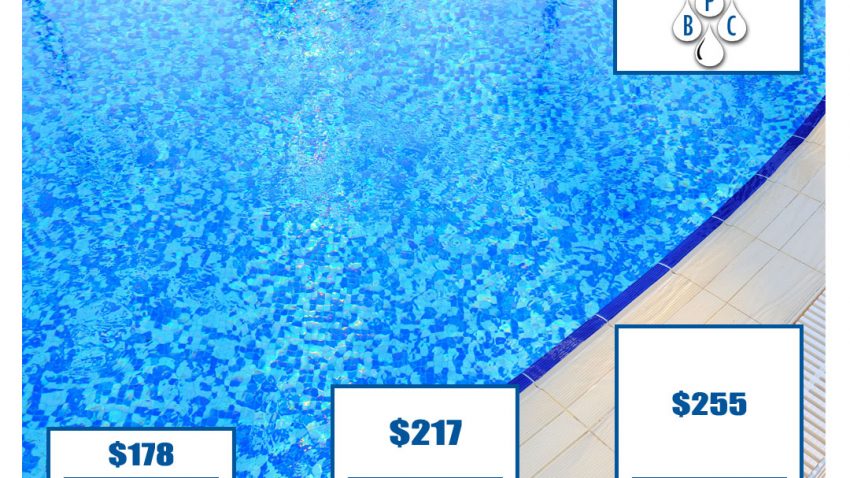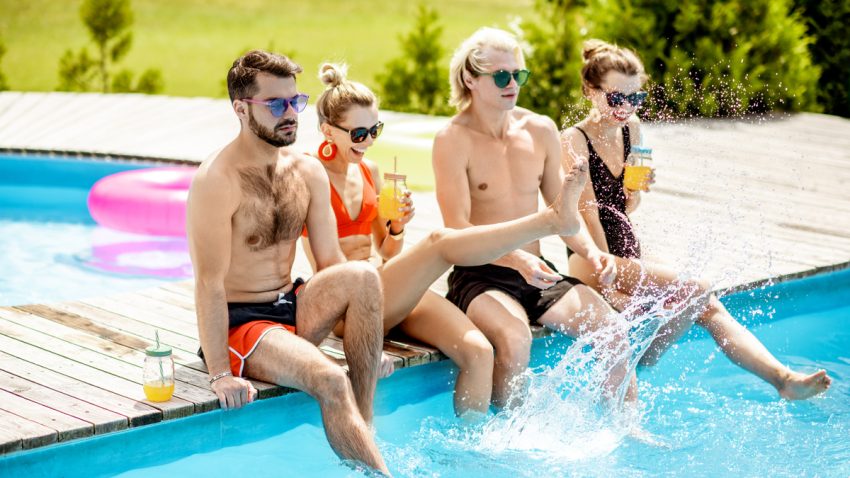Acid Wash Pool Costs in Ahwatukee 2023?

On average, acid washing a pool costs about $217, average prices ranged from $178 to $255 for pool acid washing in the US in 2023 according to improvenet.com.
What is the Cost to Acid Wash a Pool?
Your gorgeous pool is the main feature of your outdoor living area and the highlight for your social gatherings, so the growth of algae, calcium residue and stains are a major issue. Dealing with those difficult stains typically needs an acid wash, a process an experienced pool cleaner should be hired because of the dangerous chemicals that need to be used. Prior to you starting to look to hire a pool professional for the project, take a couple of minutes and learn more about what the costs involve.
Acid Wash Pool Cost
The cost to acid wash a pool is subject to your location, access to the pool’s, the time of year and how big the pool is. For a pool that measures around 500 square feet, the costs typically range from the low cost of $178 to a high cost of $255. This price comprises of the cost of labor and all the required chemicals.
If you plan to acid wash your own pool, your only costs will be for the various chemicals, in which cost about $30. You might also need to purchase a sump pump and rent or buy protective clothes.
When to Acid Wash a Pool
Having a pool built is a fantastic way to get more pleasure out of your backyard, nevertheless pools need routine maintenance to help keep the water clean and to hinder the growth of algae and/or stains. When you leave your pool unused for any period of time, the growth of algae begins to stain the surface of the pool and makes the water slippery. When your water is static and you can’t see the bottom of your pool, it’s time for the draining of the pool for an acid wash. You might also want to acid wash your pool when calcium residue has caused discoloring of the pool surface.
Benefits of Using A Professional Pool Service
Experienced and professional pool techs are required to be knowledgeable with engineering, plumbing, electrical parts and pool chemicals for servicing your pool correctly. Nevertheless, a lot of national pool companies that have high turnover rates because of low pay, often times hire inexperienced new pool techs. Despite that, a local pool professional will most likely provide a level of experience, capability and local knowledge that are invaluable. It’s a good idea to also search for and read positive online reviews for pool companies near Ahwatukee.
Acid Washing Vs. Pool Cleaning
Typical pool cleaning does not involve draining the pool. General pool cleaning processes comprise of:
- Scrubbing the pool with a stiff pool brush
- The removal of leaves and floating debris with a pool net
- Cleaning and/or the replacement of the cartridges inside the pool filter
- Checking the pools chemical levels and adjusting as required
Acid washing a pool is a more significant undertaking. It involves completely draining the pool and then utilizing an acid solution for the removal of a very fine film of the pool’s surface, hence the removal any calcium residue and stains.
Understanding Different Swimming Pool Chemicals
There are four main types of swimming pool chemicals: chlorine, bromine, pH adjusters, and algaecides.
- Chlorine is the most common pool chemical. It kills bacteria and algae by releasing a chemical reaction that forms a gas called hypochlorous acid. Chlorine can be added to the pool in liquid, granular, or tablet form.
- Bromine is a less common pool chemical than chlorine. It is also effective at killing bacteria and algae, but it is more expensive and can be more difficult to use. Bromine is available in liquid or tablet form.
- pH adjusters are used to maintain the pH balance of the pool water. The pH level should be between 7.2 and 7.8. If the pH level is too low, the water will be acidic and corrosive. If the pH level is too high, the water will be alkaline and cloudy.
- Algaecides are used to prevent the growth of algae in the pool. Algae can make the water look green and cloudy, and it can also be harmful to swimmers. Algaecides are available in liquid, granular, or tablet form.
In addition to these four main types of chemicals, there are also a number of other chemicals that can be used to maintain a swimming pool. These include:
- Scale and stain removers are used to remove mineral deposits from the pool walls and floors.
- Clarifiers are used to remove small particles from the water, making it look clearer.
- Sanitizers are used to kill bacteria and viruses in the pool water.
- Winterizers are used to protect the pool from freezing during the winter.
The amount and frequency of using pool chemicals will vary depending on the size of the pool, the climate, and the amount of use. It is important to test the pool water regularly and add chemicals as needed.
Pool Service in Ahwatukee, Arizona
BPC offers pool service in Ahwatukee, Arizona. We also offer pool maintenance and service, pool leak repair, weekly pool cleaning services, and green pool cleaning services. Give BPC a call at 480-907-7959 or text us at 602-570-8124. You can also get a free quote by filling out our contact form.
Average Swimming Pool Size

On average, the standard pool dimensions are as follows: 10 x 20-foot, 15 x 30 and 20 x 40, with a depth of 5.5 feet. A 10 x 20 pool is referred to as a small in-ground pool, while a 20 x 40 version is one of the largest swimming pool sizes, according to PoolsBySignature.
What Is The Average Pool Size?
Smaller rectangular pools measuring 12 x 24, reaching 5-feet deep will typically hold up to 10,800 gallons of water. Larger pools (16 x 32, 5-feet deep) can hold up to 19,200 gallons of water. Meanwhile, a pool measuring 20 x 40 can hold nearly 30,000 gallons of water.
It goes without saying that not every homeowner will want a rectangular swimming pool in their yard. It is crucial to consider the pool’s shape before the purchase. Shape is typically the determining factor in how big or small the pool area will be overall. In most cases, you will be able to make this determination based on the size of your yard.
How Will You Use The Pool?
How you/other family members intend to use the pool can also help determine which size works best for your needs. For example, anyone planning to swim laps each day should opt for a large rectangular pool. Clearly lay out your intentions before choosing a specific pool size.
If you are simply looking to cool off during the extreme Arizona summers, then it may make sense to choose a smaller pool design. Hosting frequent parties will likely call for a larger pool size. And, of course, the size of your family can play a huge role in determining how big the pool area needs to be.
Pool Designs
Pool design is just as important as size. For instance, you’ll want a pool with a shallow end if the kids will be swimming often. You will need to figure out how people will get in and out of the water, as well. Do you need to add a ladder or build steps to make entering and exiting an easy process for everyone?
Shallow steps or a beach entry point make it much easier for all parties to use the pool, especially individuals with mobility issues.
Pool Size Limits
Some specific factors may limit your choices in terms of overall size and accessories. Size, of course, is the biggest factor impacting price. Larger pools will require longer construction times and more maintenance needs over time. Always consider hiring pool care professionals for routine maintenance.
Here are some of the most common swimming pool sizes:
- Lap pool: A lap pool is designed for swimming laps. They are typically long and narrow, with a depth of 4 to 6 feet. The standard size for a lap pool is 25 yards long by 12.5 yards wide.
- Family pool: A family pool is designed for swimming, lounging, and playing. They are typically larger than lap pools, with a depth of 3 to 5 feet. The standard size for a family pool is 16 feet long by 32 feet wide.
- Kiddie pool: A kiddie pool is designed for young children. They are typically small and shallow, with a depth of 1 to 2 feet. The standard size for a kiddie pool is 8 feet long by 4 feet wide.
- Inground pool: An inground pool is a pool that is dug into the ground. They are typically more expensive than above-ground pools, but they are also more durable and can last for many years.
Swimming pool sizes can vary greatly, depending on the purpose of the pool, the available space, and the budget.
When choosing a swimming pool size, it is important to consider the following factors:
- The purpose of the pool: What will you be using the pool for? If you plan on swimming laps, you will need a longer pool than if you plan on just lounging and playing.
- The available space: How much space do you have in your yard? If you have a small yard, you will need a smaller pool.
- The budget: How much money are you willing to spend on a pool? Inground pools are more expensive than above-ground pools, but they can also last for many years.
Pool Service in Ahwatukee, Arizona
BPC offers pool service in Ahwatukee, Arizona. We also offer pool maintenance and service, pool leak repair, weekly pool cleaning services, and green pool cleaning services. Give BPC a call at 480-907-7959 or text us at 602-570-8124. You can also get a free quote by filling out our contact form.
